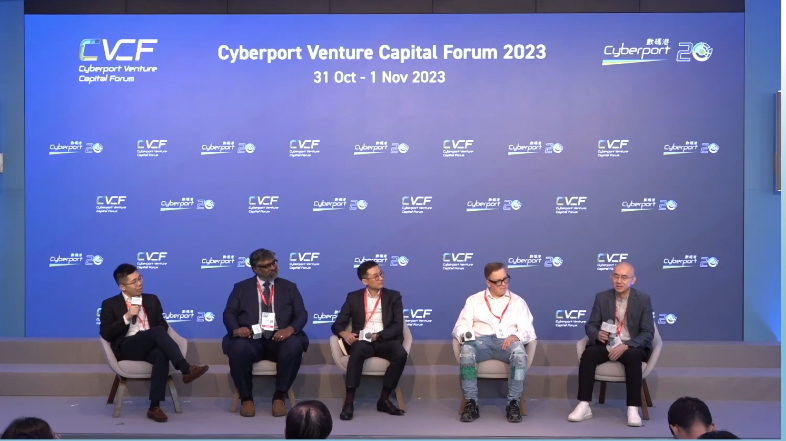
Can Real-World Asset Tokenisation Revolutionise Traditional Industries?
by Rebecca Oi November 20, 2023Tokenisation has captured the attention of global regulators and entrepreneurs, emerging as a pivotal subject with the power to fundamentally alter how real-world assets (RWA) are recognized and exchanged.
A deep dive into this topic titled ‘Real-world Asset Tokenisation and Its Impact to the Traditional Industries’ was the focus of Panel Discussion 6 at the Cyberport Venture Capital Forum 2023.
Experts including Bartosz Lipiński of Cube Group, Inc., Henry Zhang of DigiFT Tech, Louis Lee of Propcap Technologies Limited, and Niki Ariyasinghe from Chainlink Labs, discussed the transformative implications of tokenisation for conventional industries.
Moderated by Dr Thomas Zhu of the FinTech Centre of PolyU Faculty of Business, the panellists unpacked the potential unlocked by the tokenisation of assets, highlighting its significant role in the future of asset management and the broader financial landscape.
Why Tokenise Real-World Assets?
The discussion began by addressing the fundamental question: Why do we need to tokenise real-world assets, and what benefits and opportunities does it offer?

Bartosz Lipiński, CEO of Cube Group
Bartosz Lipiński, CEO of Cube Group, Inc., highlighted the efficiency gains achieved through tokenisation, particularly in high-interest rate environments where waiting for settlements can result in significant financial losses.
Real-world assets, ranging from real estate to capital markets treasuries, can benefit from increased liquidity and transparency through tokenisation.

Louis Lee, Co-founder and Chief Distribution Officer of Propcap
Louis Lee, Co-founder and Chief Distribution Officer of Propcap Technologies Limited, shared how his company streamlines overseas property mortgage applications, reducing borrowing times and improving the experience for individuals purchasing properties abroad.
Tokenisation can enhance transparency and liquidity, bridging the gap between borrowers and investors offering alternative credit and investment opportunities.

Niki Ariyasinghe, Chainlink Labs’ Head of Business Development for APAC-MENA
Chainlink Labs’ Head of Business Development for APAC-MENA, Niki Ariyasinghe, emphasised the importance of cross-chain interoperability, allowing assets and messages to flow seamlessly across different blockchains.
This is crucial for enabling the free flow of assets and improving liquidity across blockchain networks.

Henry Zhang, Founder and CEO of DigiFT Tech
Founder and CEO of DigiFT Tech, Henry Zhang, discussed his company’s journey as a decentralised exchange for security tokens, highlighting the significance of regulatory approval from tier-one jurisdictions like Singapore.
Tokenisation opens up new investment opportunities and can democratise access to assets traditionally reserved for institutional investors.
Challenges and limitations
The panel also addressed the challenges and limitations of real-world asset tokenisation. Henry noted that while technology has advanced, blockchain infrastructure, especially for high-throughput applications, is still in its early stages. Infrastructure improvements are needed to support widespread tokenisation.
Louis pointed out that standardisation is crucial for the tokenisation ecosystem. Tokenising assets should streamline processes and enhance transparency, but standardisation challenges can hinder progress.
Niki highlighted the regulatory challenges, particularly concerning stablecoins. Liquidity challenges arise due to regulatory restrictions on stablecoins, impacting their ability to generate yield.
Meanwhile, Bartosz underscored the importance of solving the liquidity issue, especially concerning stablecoins. Regulatory barriers need to be addressed to enable liquidity while ensuring security.
The convergence of DeFi and TradFi
The discussion also touched on the intersection of decentralised finance (DeFi) and traditional finance (TradFi) in real-world asset tokenisation. Panelists agreed that while both approaches have their strengths, they are not mutually exclusive.
Henry emphasised the importance of combining DeFi and TradFi to leverage the advantages of both worlds. DeFi can offer liquidity, while traditional finance provides familiarity and established practices.
Niki supported the idea of convergence, particularly in enhancing liquidity and yield generation. Real-world assets can benefit from the efficiency and transparency of DeFi protocols.
Louis noted that suitability and transparency are essential in the financial industry, and blockchain technology can improve both aspects, making it easier to match suitable investment products with retail investors.
Bartosz said that there is a need for interoperability, emphasising that combining the strengths of both DeFi and TradFi is essential for the success of real-world asset tokenisation.
Advice for regulators in Hong Kong
The panel concluded with advice for regulators in Hong Kong to foster a conducive environment for real-world asset tokenisation and blockchain innovation.
To foster the growth of tokenisation and the broader Web 3.0 ecosystem, the panellists emphasized the need for education and regulatory support. Educating retail investors and professionals about tokenisation can demystify the technology and promote its adoption.
Moreover, regulators should adopt a flexible, proactive approach that supports responsible innovation while ensuring investor protection.
Louis addressed the need for standardisation and encouraged regulators to support responsible innovation. Regulations should evolve to keep pace with the rapidly changing blockchain landscape.
Niki spoke on the role of sandbox environments and collaboration between regulators, established financial institutions, and emerging blockchain companies. Encouraging responsible innovation in a safe environment can accelerate the growth of the tokenisation ecosystem.
Henry reiterated the importance of regulators embracing innovation while promoting responsible practices. Collaboration and support for responsible innovators drive progress in the blockchain and tokenisation space.
Looking ahead
Real-world asset tokenisation is poised to revolutionise traditional industries by enhancing liquidity, transparency, and efficiency. While challenges and limitations exist, the convergence of DeFi and TradFi presents opportunities for unlocking the full potential of tokenisation.
As Hong Kong continues to explore its role in the evolving blockchain ecosystem, collaboration between regulators, innovators, and financial institutions will be crucial in shaping a thriving tokenisation landscape.









